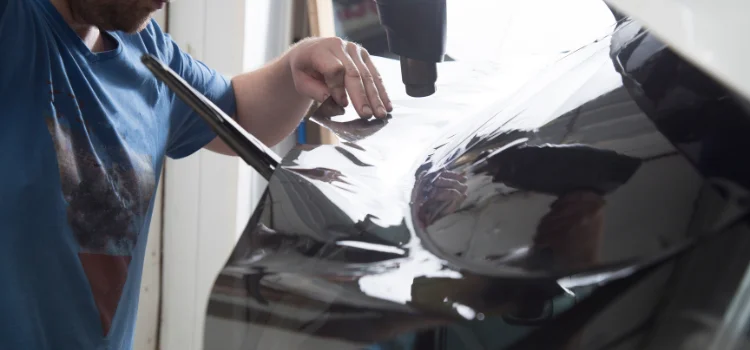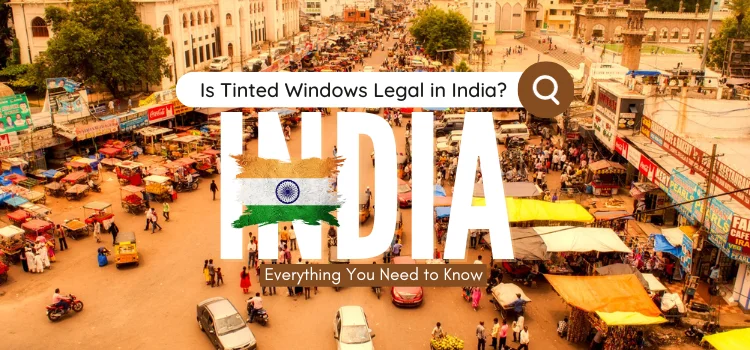Table of Contents
Tinted windows have gained popularity among car owners in India due to their numerous benefits, including privacy, protection from harmful UV rays, and enhanced aesthetics. However, it is crucial to understand the legal regulations surrounding tinted windows in India to ensure compliance with the law.
1 What are Tinted Windows?
Tinted windows refer to a film or coating applied to a vehicle’s windows, which reduces the amount of visible light transmitted through the glass. This film is available in various shades, providing different levels of darkness. Window tinting not only enhances the appearance of the vehicle but also offers practical benefits such as heat reduction, glare reduction, and UV protection.
2 Legal Regulations in India
The use of window tinting in India is governed by the Motor Vehicles Act, 1988, and the Central Motor Vehicles Rules, 1989. These regulations specify the permissible limits for windows that have been tinted for different areas of the vehicle.
Windshield
The windshield should have a clear view, allowing maximum visibility for the driver. Therefore, the use of any tint films or coatings is strictly prohibited on the windshield. This regulation ensures that drivers have an unobstructed view of the road, preventing accidents and ensuring road safety.
Front Side Windows
The front side windows, including the driver’s side and the co-driver’s side, are subject to specific restrictions. The visible light transmission (VLT) should be at least 70%, meaning that these windows must allow at least 70% of visible light to pass through them. This regulation ensures that drivers have clear visibility of the surroundings, promoting safe driving practices.
Rear Side Windows and Rear Windshield
The regulations are more relaxed for the rear side windows and rear windshield. They can have a darker tint, allowing a lower VLT. While specific values are not mentioned, it is generally accepted that a VLT of around 50% is permissible. This allows car owners to enjoy some level of privacy and protection from the sun’s glare without compromising road safety.
Reflective or Mirrored Tints
Reflective or mirrored tints are strictly prohibited on any vehicle windows. These tints can create a blinding effect for other drivers, increasing the risk of accidents. The prohibition of reflective or mirrored tints ensures that all drivers on the road have clear visibility and reduces the potential for accidents caused by glare.
3 Penalties for Violations
Using window tints that do not comply with the legal regulations can lead to penalties. The penalties may vary depending on the state where the violation occurs. Generally, the police or traffic authorities have the right to issue a challan (fine) and may also require the removal of the tint film.
The fines for using illegally tinted windows can range from a few hundred to a few thousand rupees, depending on the severity of the violation. In some cases, repeated offenses may result in the suspension of the vehicle’s registration. To avoid these penalties, car owners should ensure that their tinted windows comply with the legal regulations.
4 RTO Certification
To ensure compliance with the regulations, it is advisable to obtain a certification from the Regional Transport Office (RTO) after installing tinted films on the windows. This certification serves as proof that the tinted windows are within the permissible limits. It is essential to keep this certification with you while driving. The RTO certification provides car owners with peace of mind, knowing that their tinted windows are legal and in compliance with the law.
5 Benefits of Legal Tinted Windows

By adhering to the legal regulations for tinted windows in India, car owners can enjoy the following benefits without worries:
Privacy and Security
Window tinting provides a significant level of privacy, protecting car owners and their belongings from prying eyes and potential theft. With tinted windows, car interiors are less visible to outsiders, reducing the risk of theft or vandalism.
UV Protection
High-quality tinted films can block harmful UV rays, reducing the risk of skin cancer and protecting the interior of the vehicle from fading and deterioration due to sun exposure. UV rays can be damaging to the skin and can also cause the interior upholstery and dashboard to fade and deteriorate over time. Tinted windows act as a barrier, preventing the harmful effects of UV rays.
Heat Reduction
Window tinting can significantly reduce the amount of heat entering the vehicle, creating a more comfortable driving experience and reducing the reliance on air conditioning. This is particularly beneficial during hot summers when the sun’s heat can make the interior of the car unbearably hot. Tinted windows help to keep the car cool, reducing the need for excessive air conditioning and saving fuel.
Glare Reduction
Glare from the sun or headlights of other vehicles can be a major distraction while driving. Tinted windows help minimize glare, improving visibility and reducing eye strain. This is especially important during long drives or while driving in bright sunlight or at night when the glare from other vehicles’ headlights can be blinding. Tinted windows provide a clear view of the road, reducing the risk of accidents caused by glare.
Enhanced Aesthetics
Tinted windows add a touch of elegance and style to the vehicle, enhancing its overall appearance. The darkened windows give a sleek and sophisticated look to the car, making it stand out from the crowd. Additionally, tinted windows can also help to hide any imperfections or clutter inside the vehicle, maintaining a clean and polished look.

6 Conclusion
While Window film offer numerous benefits, it is crucial to adhere to the legal regulations set by the Motor Vehicles Act in India. By ensuring compliance, car owners can enjoy the advantages of tinted windows without facing penalties or legal issues. It is advisable to consult with professionals who specialize in automotive window tinting to ensure that the tinted films installed on the vehicle are within the permissible limits. Remember, safety and compliance should always be a priority when modifying your vehicle.
Disclaimer: This article is for informational purposes only. It does not constitute professional advice. Always consult a qualified expert for specific guidance related to your individual circumstances.
7 Frequently Asked Questions
1. What are tinted windows?
Tinted windows refer to a film or coating applied to a vehicle’s windows, which reduces the amount of visible light transmitted through the glass. They offer practical benefits such as heat reduction, glare reduction, and UV protection.
2. What are the legal regulations for tinted windows in India?
In India, the use of window tints is governed by the Motor Vehicles Act, 1988, and the Central Motor Vehicles Rules, 1989. The regulations state that the windshield should be clear, front side windows must have at least 70% visible light transmission (VLT), and rear side windows and rear windshield can have a darker tint (around 50% VLT). Reflective or mirrored tints are strictly prohibited.
3. What are the penalties for violating tinted window regulations?
Using window film that do not comply with the legal regulations can lead to penalties. The fines can range from a few hundred to a few thousand rupees, and repeated offenses may result in the suspension of the vehicle’s registration. Police or traffic authorities have the right to issue fines and may require the removal of the tint film.
4. Is it necessary to obtain RTO certification for tinted windows?
To ensure compliance with the regulations, it is advisable to obtain a certification from the Regional Transport Office (RTO) after installing tinted films on the windows. This certification serves as proof that the tinted windows are within the permissible limits. It is essential to keep this certification with you while driving to avoid penalties.











